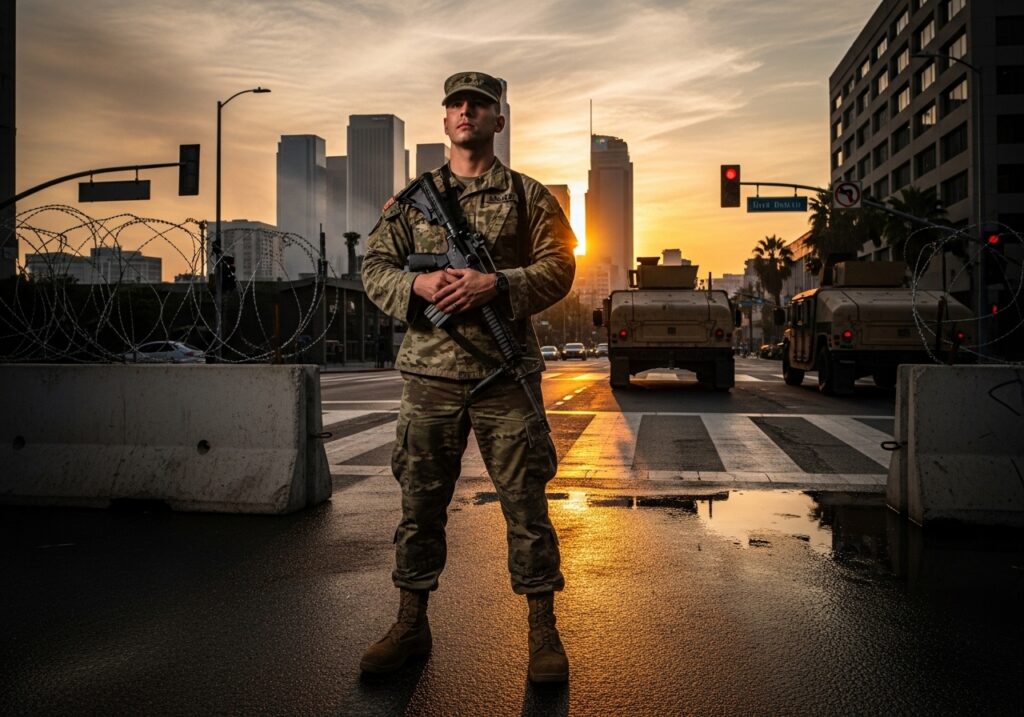A federal judge has refused California Governor Gavin Newsom’s request to remove National Guard troops from the streets of Los Angeles. This legal fight has major implications for national security, public safety, and the balance of power between state and federal government. At the heart of the matter is President Trump’s decision to deploy the National Guard earlier this year to restore order in California’s largest city, which had become a hotspot of chaos and lawlessness.
Back in June, protests over immigration enforcement policies turned into violent riots across parts of Los Angeles. Federal agents, including those from Immigration and Customs Enforcement (ICE), were reportedly targeted and overwhelmed. In response, President Trump ordered thousands of National Guard troops to the city to protect federal officers, restore order, and prevent further destruction. The move was met with sharp criticism from Governor Newsom and other state officials, who claimed the deployment was unconstitutional.
Since then, 300 National Guard soldiers have remained in the city under an extension authorized by the president in early August. These troops are scheduled to stay through early November, ensuring stability during a time of heightened political tension and continued threats of unrest.
On its face, this may sound like a simple legal disagreement between a state and the federal government. But this issue runs much deeper. It exposes a growing divide in how to handle lawlessness in American cities and raises serious questions about how far a president can go to secure peace and enforce federal laws.
Governor Newsom argues that using the military in civilian areas violates the Posse Comitatus Act, a federal law that restricts the use of armed forces in domestic law enforcement. A federal judge initially agreed, ruling that the deployment crossed a legal line. But the Trump administration immediately appealed the decision, sending the case to the 9th Circuit Court of Appeals, where it remains under review.
In the meantime, Judge Charles Breyer has said he will not move forward with a separate request from Newsom to remove the troops right now. His reason? The higher court is already looking at the issue. For now, the troops will stay, though the judge did order the White House not to use them to carry out arrests or other law enforcement actions.
This legal fight takes place in a broader context. The president has considered similar deployments in other cities like Chicago and New York, where local leaders have failed to stop violent crime and protect federal property. These decisions are not made lightly. They reflect a serious concern that some local governments are either unwilling or unable to maintain basic law and order.
From a national security standpoint, the stakes are high. If federal agents cannot safely do their jobs in American cities, the rule of law begins to break down. Terrorist threats, gang violence, and drug trafficking all thrive in environments where police and federal authorities are hamstrung. Deploying the National Guard is not about politics or optics—it’s about protecting Americans from violence and ensuring that federal laws are enforced on U.S. soil.
At the same time, the federal government must tread carefully. Overuse of the military in domestic settings risks turning the armed forces into a political tool, which is exactly what the Posse Comitatus Act was meant to prevent. That’s why these legal battles are so important. They help define the limits of federal power and ensure that those limits are respected.
But let there be no confusion about the facts on the ground. In cities like Los Angeles, federal officers have been attacked, property has been destroyed, and local leaders have failed to maintain order. In such cases, it is not only the president’s right but his duty to act in defense of the Constitution and the American people.
The coming weeks will bring more legal wrangling, but the larger issue remains: In a time of crisis, who is responsible for keeping our streets safe? For now, President Trump remains firm in his belief that federal troops are a last resort—but a necessary one—when local officials fail to do their jobs. And in a world growing more dangerous by the day, that kind of leadership may be exactly what this country needs.

